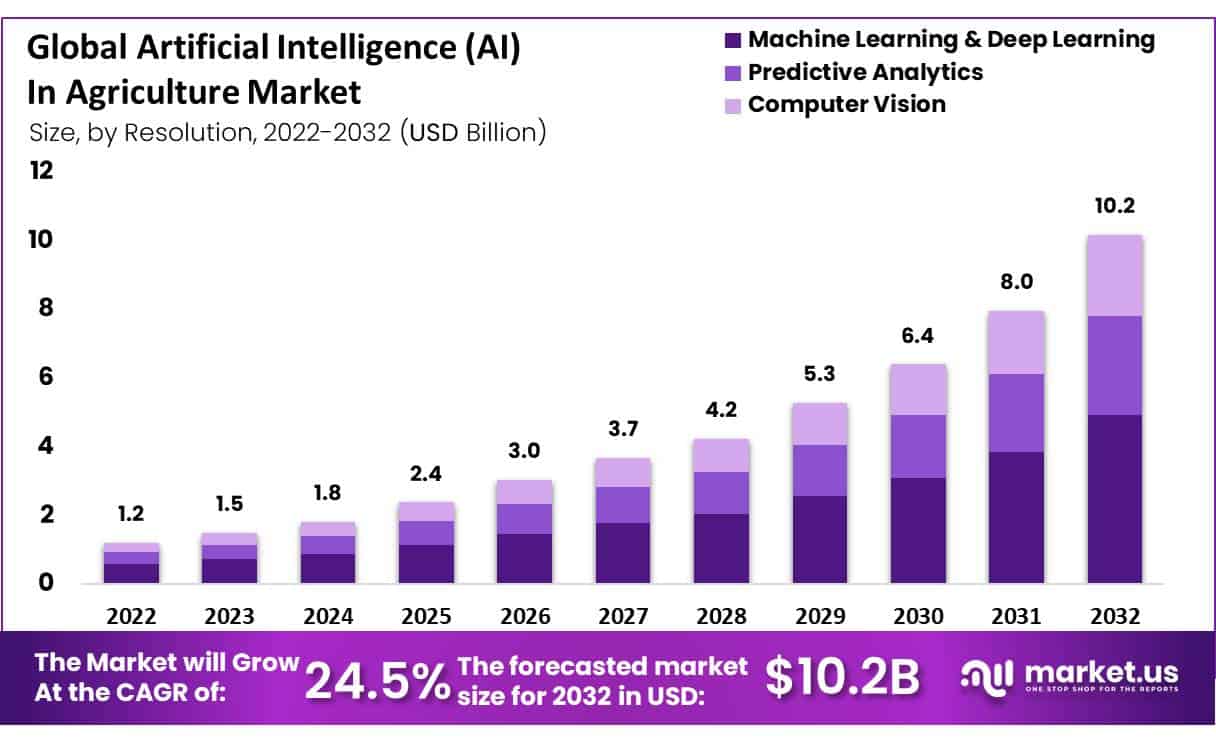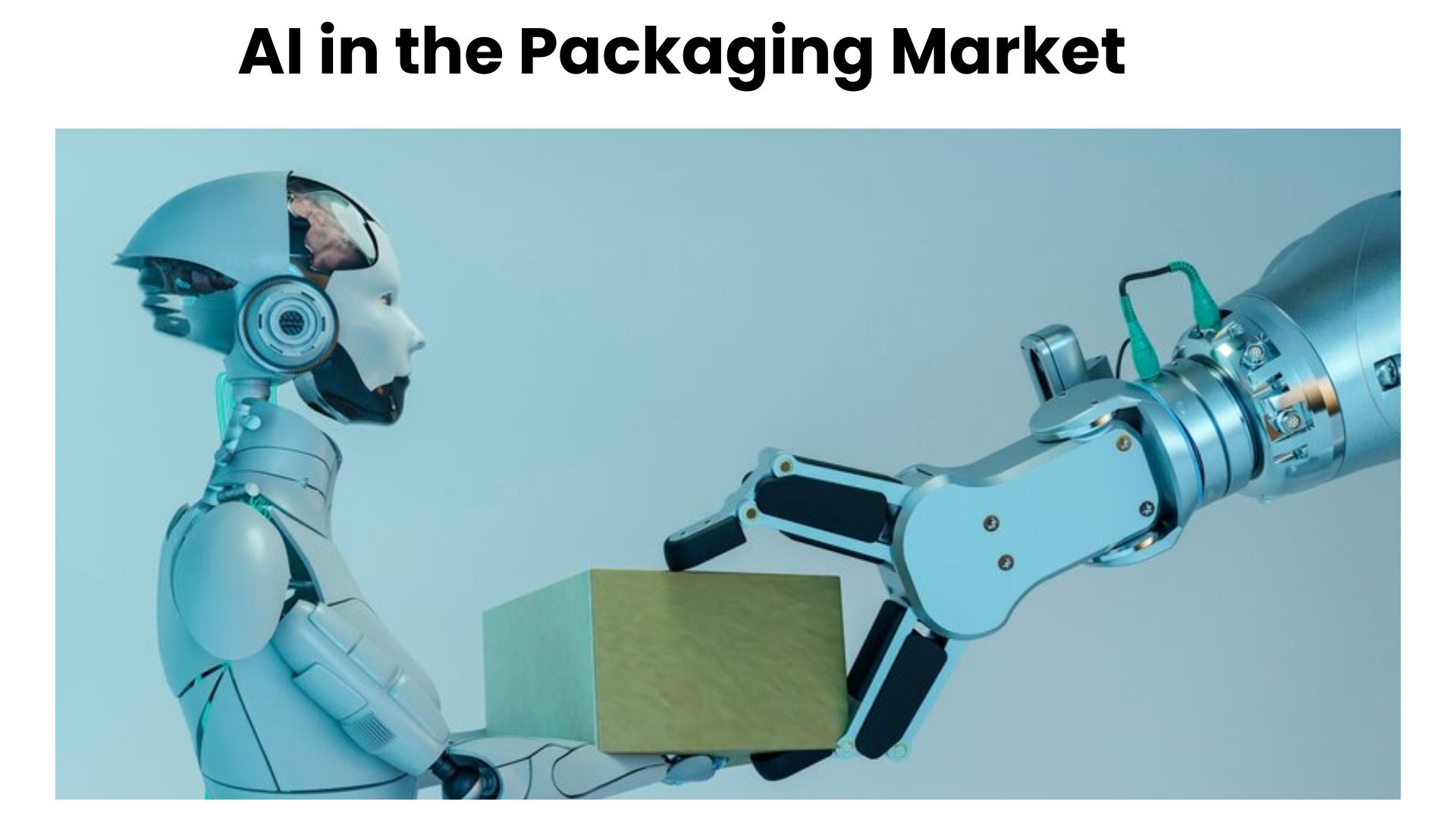Artificial Intelligence (AI) in Agriculture Market Is Projected To Reach a Revised Size Of USD 10.2 Billion By 2032, Growing At A CAGR of 24.5%

Page Contents
Market Overview
Published Via 11Press : Artificial Intelligence (AI) in Agriculture Market refers to the application of artificial intelligence technologies and solutions in order to enhance productivity, efficiency, and sustainability within agriculture. AI technology can be seen being implemented into various agricultural processes including crop monitoring, yield prediction, soil analysis, pest detection as well as irrigation management and farm automation systems.
The projected growth of the global Artificial Intelligence (AI) in Agriculture market indicates a significant increase in value, with an estimated worth of approximately USD 10.2 billion by 2032. This substantial growth is anticipated from the initial value of USD 1.2 billion in 2022, representing a compound annual growth rate (CAGR) of 24.5% during the forecast period spanning from 2022 to 2032.
AI can bring many advantages to agriculture. It allows farmers to make informed decisions based on data-driven insights, and optimize resource usage and costs while simultaneously increasing crop yields. AI algorithms can analyze large volumes of collected information collected via sensors, satellites, drones, etc, and provide helpful recommendations that optimize planting schedules, predict crop diseases more precisely manage irrigation more efficiently optimize fertilizers and pesticide usage as well as maximize harvest yields.
Request For Sample Report Here: https://market.us/report/artificial-intelligence-ai-in-agriculture-market//request-sample/

Key Takeaway
- Rapid Development: AI in the agriculture market has experienced exponential expansion due to factors like an increasing population, rising food demand, and sustainable farming practices.
- Benefits of AI Technologies in Agriculture: Artificial intelligence can bring many advantages to agriculture such as data-driven decision-making, optimizing resource use efficiency and cost reduction as well as increased crop yields.
- Technology Applications: AI can be applied in many agricultural processes such as crop monitoring, yield prediction, soil analysis, pest detection and management as well as irrigation management and farm automation.
- AI Technologies in Agriculture: Agriculture uses AI technologies such as machine learning, computer vision analysis, natural language processing, and robotics extensively in their work.
- Market Players: Established technology firms such as IBM, Microsoft, and Google as well as startups are active participants in the AI in the agriculture market.
- Collaboration and Innovation: Working collaboratively among technology firms, agricultural machinery manufacturers, and research institutions drives innovation within the agricultural machinery sector.
Regional Snapshot
- North America: North America is an innovative market for agricultural AI applications due to the presence of major tech companies, robust research and development initiatives, and emphasis on advanced farming techniques. Particularly notable is the US' adoption of AI farming applications like precision farming, crop monitoring, and farm management systems.
- Europe: Europe stands as another key region in terms of AI in agriculture market development, with countries like the Netherlands, Germany, and France spearheading the adoption of advanced farming technology and AI solutions for farming operations such as smart farming practices using robotics or precision agriculture enabled by AI solutions.
- Asia Pacific: AI in the agriculture market in this region has experienced immense expansion. Countries like China, India, Japan, and Australia are increasingly adopting these technologies in order to boost agricultural productivity, address food security concerns and optimize resource utilization – this includes everything from crop monitoring and pest detection systems through drones and robotics to precision farming techniques.
- Latin America: AI adoption has rapidly gained interest across Latin American agriculture. Countries like Brazil, Argentina, and Mexico are investing in AI technologies to increase agricultural efficiency and productivity – including yield prediction, soil analysis, irrigation management, and disease detection. Startups and technology companies play a vital role in driving this market growth across Latin America.
Drivers
- Population Increase and Food Demand: With population levels on the rise and food demands ever-increasing, farmers need ways to maximize crop yields while optimizing resource utilization and increasing efficiency if they hope to keep pace with meeting rising food needs. Thanks to AI technology, AI-enabled farming techniques enable producers to boost yields while optimizing resource use & efficiency and help meet rising food demands more easily.
- Sustainable Farming Practices: With increasing environmental concerns and limited resources becoming ever more pressing, sustainable agricultural practices have never been more important. Artificial intelligence in agriculture provides tools and techniques that optimize inputs such as water, fertilizers, and pesticides – thus decreasing waste while simultaneously decreasing the ecological footprint of farming practices.
- Technological Advancements: Advancements in AI technologies like machine learning, computer vision, and robotics have become more accessible and affordable to farmers. Increased usage of sensors, drones, and satellite imaging provides valuable data that AI systems use for more precise decision-making that happens quickly in real-time.
- Big Data and Analytics: With access to large-scale agricultural data combined with powerful analytical capabilities, Artificial Intelligence is quickly emerging as a player in agriculture. AI algorithms are capable of processing vast amounts of sensor-, weather station- and historical record data collected via sensors; extracting meaningful insights or patterns which aid decision-making as well as predictive modeling processes.
Make an inquiry before picking up this report @ https://market.us/report/artificial-intelligence-ai-in-agriculture-market//#inquiry
Challenges
- Access and Quality: AI systems in agriculture depend heavily on high-quality data for accurate analysis and decision-making, but accessing such comprehensive and reliable sources may prove challenging in regions with limited connectivity or insufficient infrastructure for data collection. Privacy, Standardization, and Interoperability Issues also pose difficulties that must be dealt with accordingly.
- Digital Divide: There exists a digital gap between urban and rural areas, limiting access to technology and connectivity for remote agricultural regions. Unequal access to AI technologies, internet connectivity, and digital literacy may impede adoption in agriculture – especially among small-scale farmers or developing nations.
- Initial Investment Costs: Adopting AI technologies into agriculture often requires significant upfront investments. These expenses include purchasing hardware, sensors, drones, and software as well as data collection expenses such as analysis and integration costs – which may deter some farmers with limited financial resources from adopting these new technologies.
- Complexity and Technical Expertise: AI technologies are complex systems requiring technical knowledge for effective deployment and management. Farmers may not possess sufficient skill sets or knowledge needed to use and interpret AI tools or address any potential technical issues; training programs with user-friendly interfaces could serve to bridge that divide for wider adoption of these technologies.
Key Players
- Raven Industries Inc.
- Farmers Edge Inc.
- Deere & Company
- A.A Taranis Visual Ltd.
- Gamaya SA
- AGCO Corporation
- Bayer AG
- IBM Corporation
- Ag Leader Technology
- Trimble Inc.
Market Segmentation
By Technology
- Machine Learning & Deep Learning
- Predictive Analytics
- Computer Vision
By Application
- Precision Farming
- Drone Analytics
- Agriculture Robots
- Livestock Monitoring
- Labor Management
- Agriculture Robots
- Other Applications
By Component
- Hardware
- Software
- Service
- AI-as-a-Service
Top Impacting Factors
Technological Advancements: AI technologies like machine learning, computer vision, and robotics drive innovation and adoption of AI in agriculture. Constant improvements to sensor technologies, data analytics, and automation provide more accurate and efficient agricultural processes resulting in increased productivity and sustainability.
Government Initiatives and Policies: Government initiatives, policies, and funding programs play a pivotal role in encouraging AI technologies' adoption in agriculture. Governments around the globe recognize AI's potential to address food security concerns while improving productivity while mitigating environmental damage; investments made into research & development facilities as well as training programs provide incentives to farmers embracing artificial intelligence technologies.
Sustainable Farming Practices: AI adoption in agriculture has long been motivated by its potential to support environmentally-friendly agricultural activities, helping farmers optimize resource usage, reduce wastefulness and mitigate any associated environmental impact of activities such as harvesting.
Recent Developments
- Technological Advancements: Innovation and adoption of AI technologies like machine learning, computer vision, and robotics are at the core of agricultural AI applications. Continuous improvements to sensor technologies, data analytics, and automation enable more precise and sustainable agricultural practices leading to increased productivity and sustainability.
- Government Initiatives and Policies: Government initiatives, policies, and funding programs play a vital role in encouraging AI adoption within agriculture. Governments worldwide recognize its potential to address food security challenges while simultaneously increasing agricultural productivity while decreasing environmental impact. Investments made into research & development infrastructure training encourage farmers and agribusinesses alike to embrace AI technologies.
- Sustainable Farming Practices: Sustainability in farming is one of the primary drivers behind AI adoption in agriculture, as AI technologies allow farmers to increase resource usage while decreasing waste production and environmental impacts associated with agricultural activities.
- Increased Global Population and Food Demand: With global population levels on the rise and food demand continuing to soar, pressure on the agriculture sector has intensified significantly. Artificial Intelligence can assist agriculturalists by improving crop yields, optimizing farming processes, and increasing overall efficiency.
Report Scope
| Report Attribute | Details |
| The market size value in 2023 | US$ 1.2 Bn |
| Revenue Forecast by 2032 | US$ 10.2 Bn |
| Global Market Growth Rate (2023 to 2033) | CAGR Of 24.5 % |
| Regions Covered | North America, Europe, Asia Pacific, Latin America, and Middle East & Africa, and Rest of the World |
| Historical Years | 2017-2022 |
| Base Year | 2022 |
| Estimated Year | 2023 |
| Short-Term Projection Year | 2028 |
| Long-Term Projected Year | 2032 |
Frequently Asked Questions
Q. What is AI in agriculture?
A. AI in agriculture refers to the use of artificial intelligence technologies to improve farming practices and processes.
Q. How does AI benefit agriculture?
A. AI benefits agriculture by enhancing productivity, optimizing resource usage, enabling precision farming, and improving decision-making.
Q. What are some AI applications in agriculture?
A. AI applications in agriculture include crop monitoring, pest detection, yield prediction, precision irrigation, and autonomous farming.
Q. How does AI help with crop monitoring?
A. AI technologies analyze data from sensors, drones, and satellites to monitor crop health, detect diseases, and optimize farming practices.
Q. Can AI automate farming tasks?
A. Yes, AI-powered robotics and automation can automate tasks like planting, harvesting, and weeding, reducing the labor required
Contact:
Global Business Development Team – Market.us
Market.us (Powered by Prudour Pvt. Ltd.)
Send Email: [email protected]
Address: 420 Lexington Avenue, Suite 300 New York City, NY 10170, United States
Tel: +1 718 618 4351
Website: https://market.us
Content has been published via 11press. for more details please contact at [email protected]
The team behind market.us, marketresearch.biz, market.biz and more. Our purpose is to keep our customers ahead of the game with regard to the markets. They may fluctuate up or down, but we will help you to stay ahead of the curve in these market fluctuations. Our consistent growth and ability to deliver in-depth analyses and market insight has engaged genuine market players. They have faith in us to offer the data and information they require to make balanced and decisive marketing decisions.


